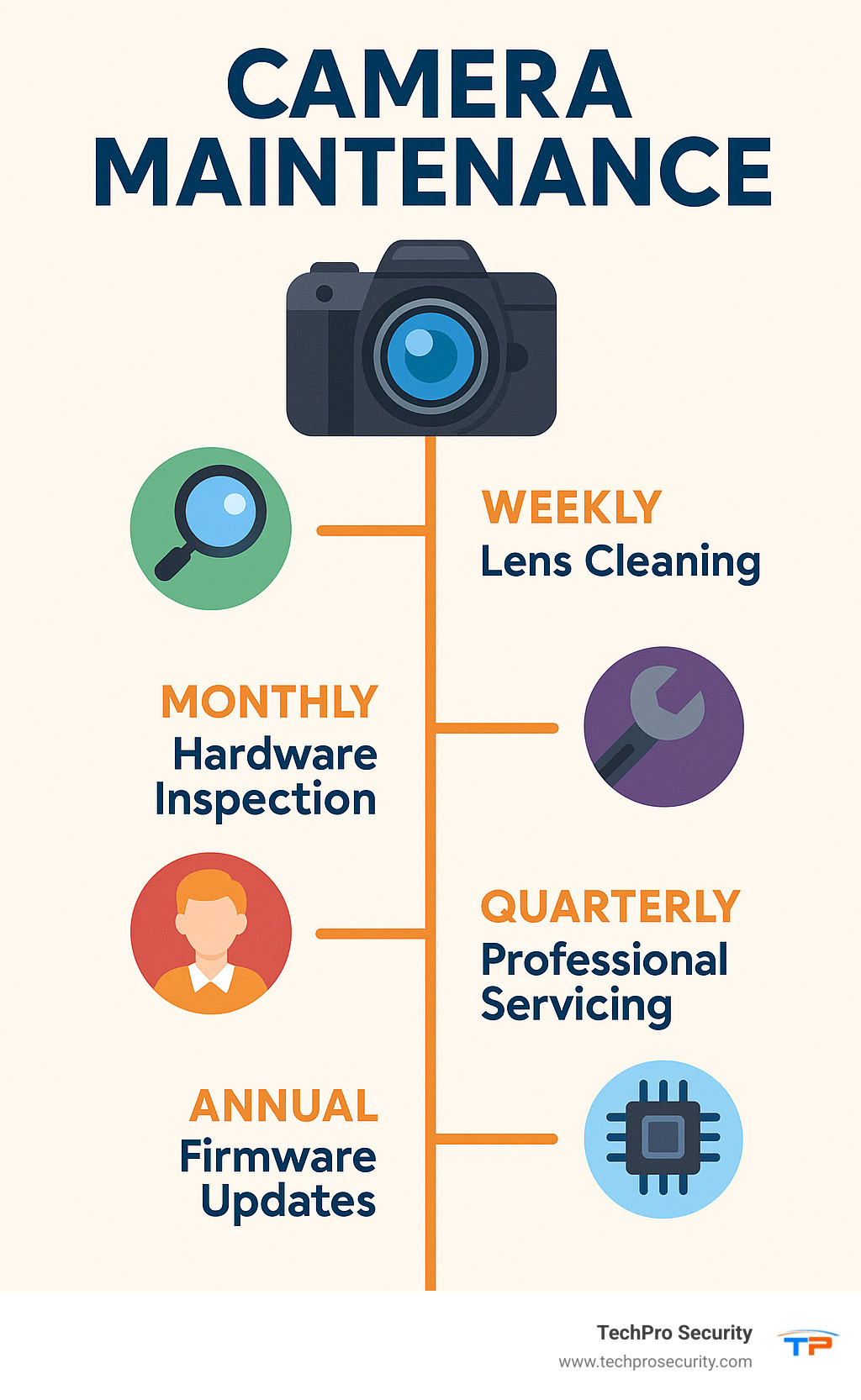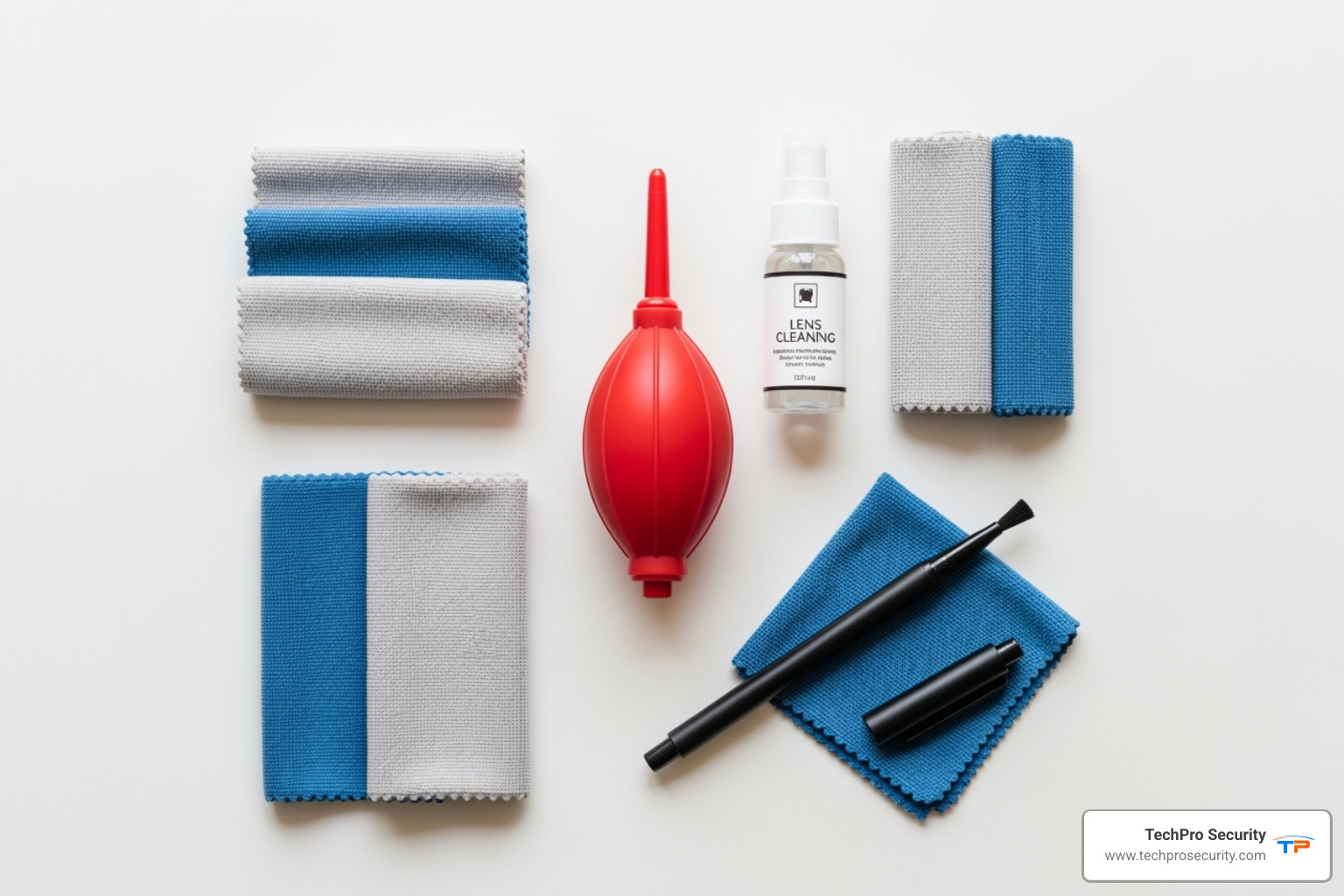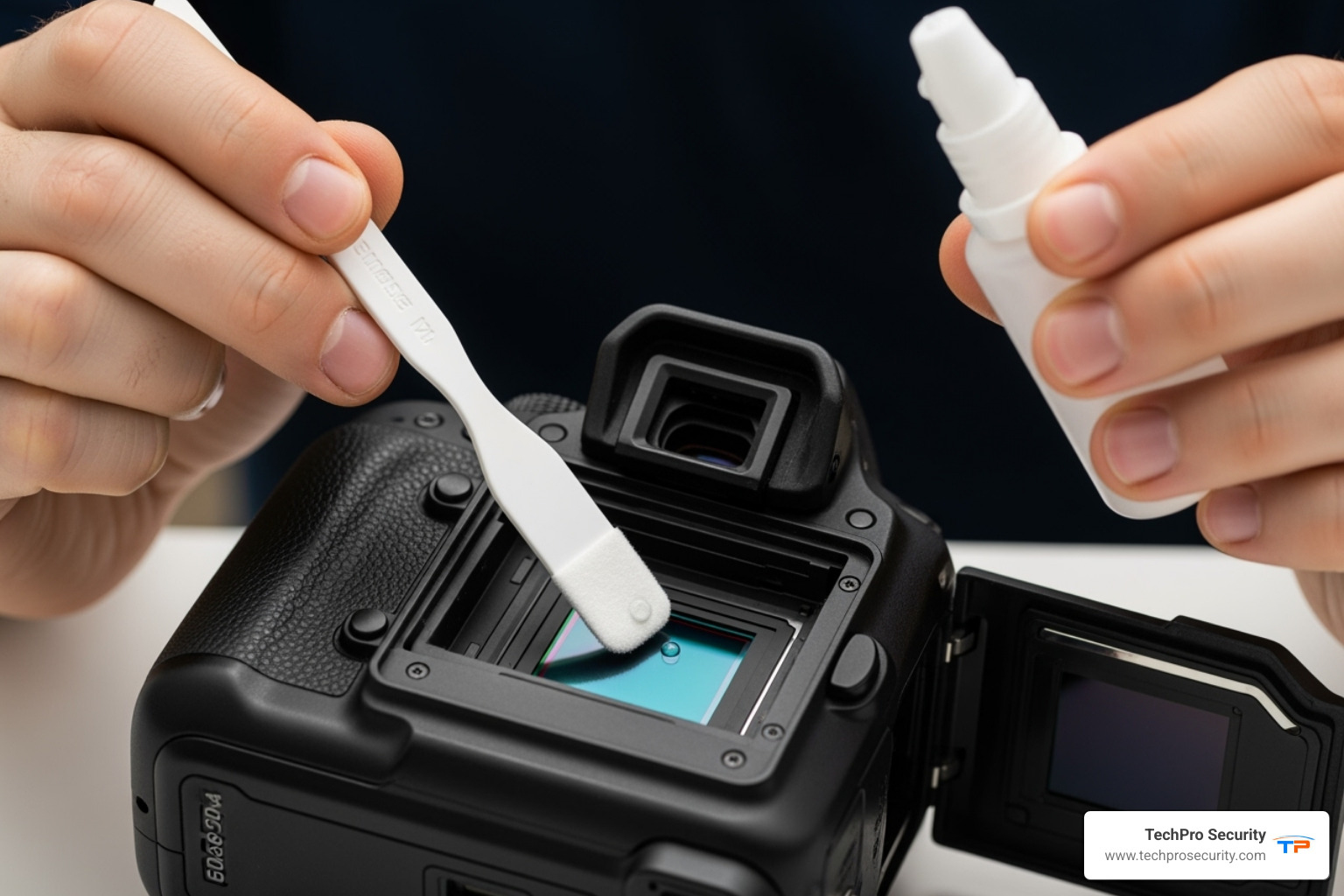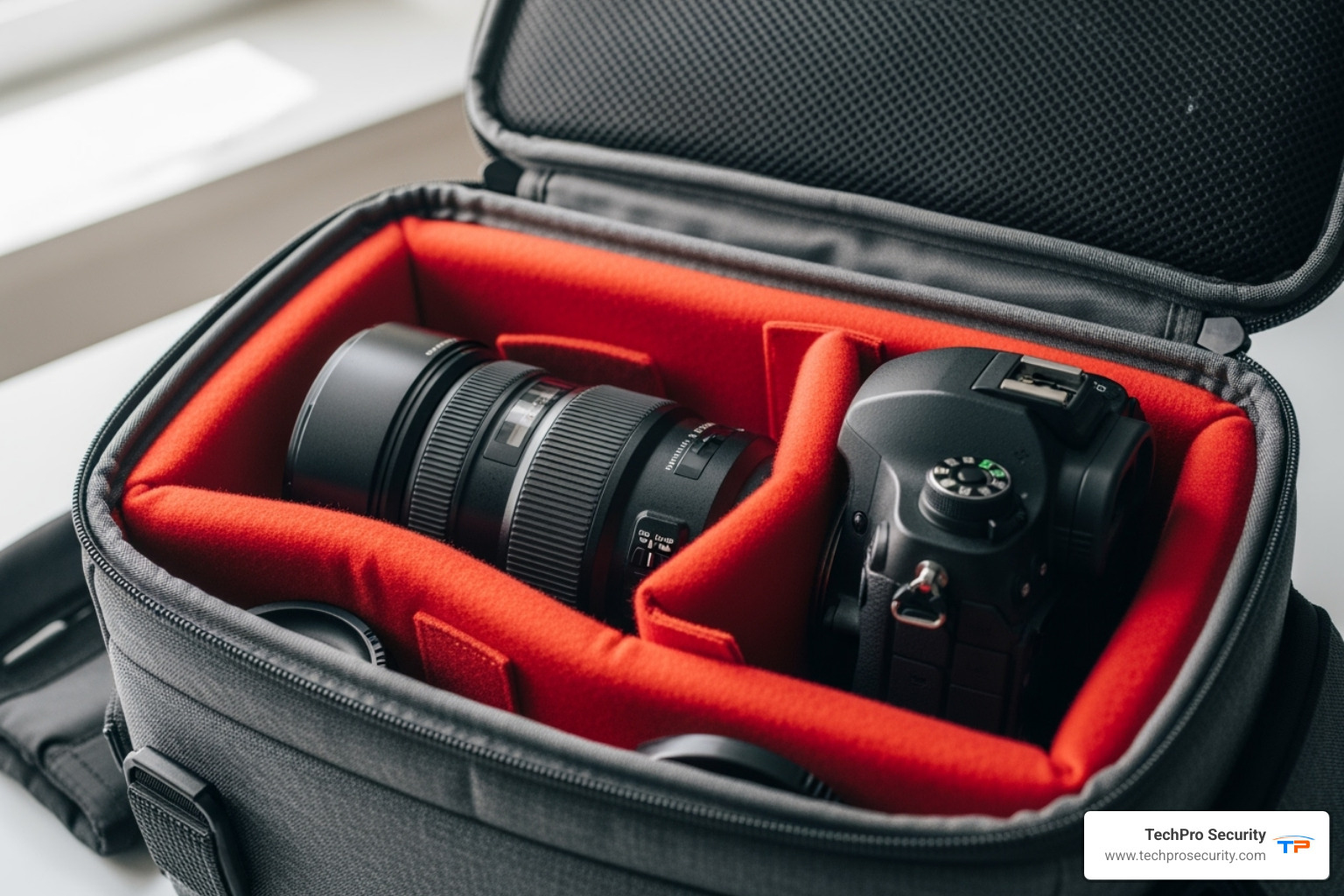Camera Maintenance: Master in 30 Days! Perfect Shots
Why Camera Maintenance is Critical for Your Security Investment
Camera maintenance is the foundation of a reliable security system. Poorly maintained cameras can fail when you need them most, leaving blind spots that criminals can exploit.
Essential camera maintenance includes:
- Weekly cleaning of lenses and housings for clear footage.
- Monthly inspection of connections and mounting hardware.
- Quarterly professional servicing for complex systems.
- Annual firmware updates for optimal performance.
- Immediate attention to image quality issues or error messages.
Regular maintenance prevents common failures like blurry images, system crashes, and equipment failure from environmental damage. Security cameras operate 24/7 in harsh conditions, requiring consistent care. A single malfunctioning unit can create a critical vulnerability. By following a structured maintenance routine, you’ll extend your equipment’s lifespan and ensure your investment continues protecting your family and assets.
I’m Brad Besner, founder of TechPro Security Products. With over 15 years of experience designing and maintaining security systems in South Florida’s challenging climate, I’ve developed proven strategies to keep surveillance systems at peak performance.

Simple guide to camera maintenance:
Your Essential Camera Care Toolkit
Proper camera maintenance requires the right tools. A dedicated cleaning kit is essential for protecting your investment and ensuring your gear works perfectly.

The foundation of good camera maintenance is a rocket blower, which safely removes loose dust without contact, preventing scratches. Next, you’ll need soft, lint-free microfiber cloths made for optics. Keep separate cloths for lenses and camera bodies.
For stubborn smudges, use an alcohol-free lens cleaning solution. The LensPen is a versatile tool with a soft brush on one end and a carbon-based tip on the other for removing oily smudges. A separate soft brush is great for cleaning crevices around lens barrels and camera bodies.
For advanced users, sensor swabs are designed for careful DIY sensor cleaning, though many prefer professional service for this delicate task. Cotton swabs are useful for cleaning small areas like button crevices or lens contacts.
Choosing the Right Supplies
Your camera’s safety should guide every choice.
- Use Non-Abrasive, Alcohol-Free Cleaners: Household glass cleaners and harsh chemicals can strip protective coatings and damage electronics. Alcohol-free solutions are gentle on lens coatings, while pure isopropyl alcohol can be used sparingly on camera bodies and contacts.
- Stick to Lint-Free Materials: Lint left behind by regular cloths will show up in your photos. Use only microfiber cloths and specialized lens tissues.
- Avoid Compressed Air: Canned air can release moisture and propellants that damage delicate internal components. A rocket blower is a safer and more effective alternative.
- Invest in Purpose-Made Tools: Tools engineered for cameras ensure effective cleaning without causing accidental damage.
The Core Cleaning Routine: Step-by-Step
Consistent camera maintenance ensures your equipment serves you well over time. Regular attention is better than emergency intervention.

A quick post-shoot cleaning should be automatic, especially after exposure to humidity or sand. This prevents small issues from becoming expensive problems. For weekly maintenance, a gentle wipe-down of the body and lenses is sufficient. A monthly deep clean involves a more thorough inspection of ports, contacts, and overall condition. Creating a schedule is key; at TechPro Security, we’ve found that scheduled maintenance prevents 90% of reactive service calls.
How to Clean Your Camera Body
Start with your rocket blower to dislodge loose particles from the entire body, especially textured grips. For the exterior wipe-down, use a microfiber cloth slightly dampened with distilled water. This is crucial for removing corrosive salt spray after being near the ocean. Use a soft brush or dry cotton swab to clean ports and dials. For the viewfinder, use a rocket blower for dust and a barely-damp microfiber cloth for smudges on the exterior glass. Treat the LCD screen similarly: blower first, then a dry microfiber cloth. Use a specialized LCD cleaner on the cloth for stubborn marks. Finally, check port covers to ensure they seal properly and are free of debris to protect sensitive electronics.
How to Clean a Camera Lens
A clean lens is vital for image quality. Always start with your rocket blower to blow away loose particles before wiping. When wiping, use a circular motion from the center outward. Apply a drop of lens cleaning solution to your microfiber cloth, never directly on the lens. Clean both front and rear elements, as the rear element also collects dust. Dirty lens contacts can cause autofocus issues; wipe them with a dry microfiber cloth or a cotton swab lightly dampened with isopropyl alcohol. Don’t forget lens cap hygiene—clean your caps to avoid recontaminating a clean lens.
The Proper Procedure for Camera Sensor Maintenance
Dust on your camera sensor appears as dark spots in your images.

DIY versus professional cleaning is a key decision. We recommend leaving this delicate work to trained technicians, as the cost is minimal compared to replacing a damaged sensor. To check if cleaning is needed, set your camera to a small aperture (f/16 or f/22) and take a test shot of a plain, bright surface. Zoom in to look for dark spots.
If you proceed with DIY cleaning, use your camera’s sensor cleaning mode with a fully charged battery. Hold the camera with the lens mount facing down and use a rocket blower to dislodge dust. For stubborn particles, use sensor swabs designed for your sensor size. Apply 1-2 drops of cleaning solution to the swab, make one smooth pass, flip it, and make a return pass. Use each swab only once.
Common Mistakes to Avoid in Camera Maintenance
- Using your breath to clean: Your breath contains acids that can degrade lens coatings.
- Applying solution directly to lenses: Liquid can seep into the lens or camera body, causing fungus or electronic damage. Apply solution to your cloth first.
- Using dirty cloths: This can scratch delicate surfaces. Wash microfiber cloths regularly and store them in clean bags.
- Touching the sensor: This can cause irreparable damage. If unsure, seek professional service.
- Using canned air on internals: Propellants and moisture can damage sensitive components. Use a rocket blower instead.
- Neglecting accessories: A dirty camera bag or lens cap can recontaminate clean gear. At TechPro Security, we know that comprehensive maintenance includes every component.
Proactive Care for Camera Longevity
Proactive camera maintenance extends your equipment’s life and performance. It’s a small effort that prevents major issues later.

Install firmware updates from your manufacturer’s website to fix bugs and improve performance. For battery care, avoid repeated overnight charging and remove the battery for long-term storage. Replace swollen batteries immediately. For security systems, a UPS is recommended. For memory card management, reformat cards in-camera periodically to prevent data corruption and store them in protective cases.
Best Practices for Storing Your Gear
Proper storage is crucial for longevity.
- Dry Storage: Aim for a humidity level between 36-44% to prevent mold and seal deterioration.
- Padded Camera Bags: Use a quality bag that fits your equipment snugly to protect against bumps, temperature changes, and dust.
- Silica Gel Packs: Place these in your camera bag to absorb excess moisture. Replace or reactivate them every few months.
- Avoid Extreme Temperatures: Never leave your camera in a hot car or freezing conditions. Allow gear to acclimate gradually when moving between temperature extremes.
- Long-Term Storage: Always remove batteries to prevent leakage and corrosion.
Protecting Gear from Environmental Exposure
Being prepared for the elements is smart. In South Florida, this is a daily reality.
- Dust and Sand: Minimize lens changes in dusty environments. Use a rocket blower extensively before wiping gear after exposure.
- Humidity and Moisture: Use weather-sealed gear when possible. If equipment gets wet, dry it immediately and seek professional help if it gets soaked. Do not turn it on.
- Heat and Cold: Use insulated bags in harsh conditions and allow for gradual temperature adjustment to prevent condensation.
- UV filter for protection: A UV filter acts as a bodyguard for your front lens element, taking scratches and impacts instead of your expensive lens.
- Rain Covers: These are lifesavers in unexpected downpours, protecting your camera and lens from water damage.
Maintenance for Different Camera Types
Different cameras have different needs.
| Feature/Maintenance Aspect | Digital Cameras (DSLR/Mirrorless) | Film Cameras | Security Cameras (IP/CCTV) |
|---|---|---|---|
| Sensor/Film Plane | Digital sensor (delicate, dust-prone) | Film gate/pressure plate | Digital sensor (often sealed) |
| Cleaning Focus | Sensor cleaning, lens contacts | Film path, light seals | Lens cleaning, housing integrity |
| Firmware Updates | Regular and critical | Not applicable | Regular and critical |
| Mechanical Parts | Shutter, autofocus motor, lens elements | Shutter, film transport, aperture | PTZ mechanisms, focus motors |
| Battery Care | Rechargeable Li-ion, frequent charging | Often uses disposable button cells | Continuous power (PoE, AC/DC) |
| Environmental Impact | Dust, moisture, heat, sand | Dust, moisture, heat (can dry out seals) | Extreme weather, vandalism, continuous exposure |
| Storage | Dry, padded bag, silica gel | Dry box, humidity control (for seals) | Secure mounting, weather-resistant housing |
| Servicing Frequency | Annually or as needed (heavy use) | Every 2-3 years (CLA for vintage) | Annually (professional audit) |
Digital sensor care is paramount due to dust attraction. Film camera light seals often degrade over time and need replacement; for more details, see How to clean your film camera?. Security cameras face the harshest conditions, requiring a focus on housing integrity, lens cleaning, and firmware updates. For professional help, visit More info about security camera installation.
When to Seek Professional Servicing
Even with diligent camera maintenance, some situations require professional expertise. Knowing when to call a pro can save you from costly mistakes.
For heavily used cameras, manufacturers recommend professional servicing every 1-2 years. The research shows that professional photographers may need camera servicing more than once per year. However, your usage and shooting environment are the best guides. If you frequently shoot in dusty or humid conditions, more frequent check-ups are wise.
A CLA (Clean, Lube, Adjust) is a comprehensive service, especially for film cameras. It involves deep cleaning, lubricating moving parts, and calibrating mechanisms like shutter speeds. For digital cameras, professional servicing includes checking the sensor, focus system, hardware, shutter count, and firmware. At TechPro Security, our CCTV services provide similar thorough maintenance for security systems facing continuous operation.
Signs Your Camera Needs Professional Repair
Pay attention to these warning signs:
- Persistent spots on images: If spots remain after you’ve cleaned your sensor, the debris may be on an internal element that requires professional cleaning.
- Autofocus issues: Consistent focus hunting, soft images, or front/back focusing suggest the AF system needs calibration or repair.
- Shutter problems: A sluggish, jammed, or erratic shutter, or unevenly exposed images, indicates a serious mechanical issue.
- Persistent error messages: If error codes remain after basic troubleshooting (restarting, changing battery/card), it points to an internal malfunction.
- Physical damage: Cracked screens, dented lenses, or broken dials should always be handled by a professional to avoid further damage and voiding warranties.
- Water damage: This requires immediate professional help. Never turn on a water-damaged camera. Remove the battery and take it to a service center immediately to prevent corrosion.
Frequently Asked Questions about Camera Care
Here are answers to common questions about camera maintenance I’ve heard from clients at TechPro Security and photography enthusiasts alike.
How often should I clean my camera?
It depends on your usage. A good rule of thumb:
- After every shoot: A quick once-over with a rocket blower, especially after being in dusty or sandy environments.
- Monthly: A deeper clean for regularly used cameras, including the body, lenses, and ports.
- Immediately after harsh conditions: If you’ve been in rain, sand, or heavy dust, clean your gear as soon as possible to prevent contaminants from setting in.
Sensor cleaning is only necessary when you see spots in your photos.
Can I use household products to clean my camera?
No. Household cleaners like glass cleaner contain chemicals that can strip the delicate anti-reflective coatings from your lens. Paper towels and regular cloths can leave fine scratches. Always use products specifically designed for camera equipment to avoid permanent damage. The small investment in proper supplies is worth it.
What is the single most important maintenance tip?
Prevention is better than cure. The most effective maintenance is stopping problems before they start.
- Always use your lens and body caps. This simple habit prevents the vast majority of dust, scratches, and impacts.
- Store your camera properly in a padded bag. This protects it from bumps, drops, and environmental hazards.
For our security camera installations, prevention means using weather-resistant housings and secure mounts. A lens cap costs a few dollars; a new lens can cost thousands. The choice is simple.
Conclusion
Caring for your camera requires dedication, but the payoff is years of reliable performance and crystal-clear images. This guide has covered everything from your essential toolkit to advanced sensor care.
The key takeaway is that consistency is crucial. A quick clean after each shoot, a monthly deep clean, and proper storage will prevent most issues. Remember the golden rule: prevention beats cure every time. Use lens caps, store gear in padded bags, and protect it from harsh environments. If you encounter persistent issues like spots on images or autofocus problems, seek professional help to avoid costly DIY mistakes.
A well-maintained camera holds its value better and performs reliably when you need it most. For professional-grade security camera systems in South Florida, the experienced team at TechPro Security applies these same principles of consistent, expert care. Our comprehensive maintenance ensures your property remains protected around the clock.

